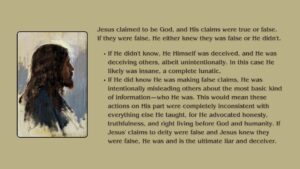A Bible Study
Upholding Jesus’ Deity and Absolute Truth in a Relativistic Age
A complete introduction to this Bible study is available here.
Today, an increasing number of people who claim to be believers are denying the existence of absolute truth. A recent article published at disrn.com [now notthebee.com] offers a snapshot of a soon-to-be-released poll conducted by LifeWay Research (LWR). LWR administered the survey in partnership with Ligonier Ministries, which performs a “State of Theology study” every other year. The survey found that just over half of Americans — 52% — and nearly one-third of evangelicals — 30% — affirm Jesus as a “good teacher, but…not God.”
Thirty percent of evangelicals — nearly one-third — affirm Jesus as a “good teacher, but…not God.”
—results of a survey conducted by LifeWay Research for Ligonier Ministries’s State of Theology report—
~~~~~~~~~~~~~~~~~~~~~~~~~~~~~~~~
Update: In September of 2022, a similar study conducted by the same researchers found (PDF) that “43% of American evangelicals do not believe that Jesus is God”:
This year’s survey…revealed a significant increase in evangelicals who deny Jesus’ divinity. Such a belief is contrary to Scripture, which affirms from beginning to end that Jesus is indeed God (John 1:1; 8:58; Rom. 9:5; Heb. 1:1-4).
43% of those surveyed agreed (either strongly or somewhat) with the statement, “Jesus was a great teacher, but he was not God.” In 2020 survey (the survey that is the primary focus of this Bible study), 30% agreed. The situation, therefore, has worsened.
In relation to a belief in objective, absolute truth, in 2022, 38% of evangelicals agreed (either strongly or somewhat) with this statement: “Religious belief is a matter of personal opinion; it is not about objective truth.” In 2020, 23% agreed. In this area, the situation also has worsened.
The complete analysis of the 2022 survey and changes it indicates have taken place since previous similar surveys were completed is available here.
~~~~~~~~~~~~~~~~~~~~~~~~~~~~~~~~
The Church Must Address this Issue
Why is it that nearly one-third of those claiming to be evangelicals reject the teaching that Jesus is God, yet still say He was a good teacher? What’s wrong with this statement anyway — and what does it have to do with absolute truth?

As we discussed in recent Word Foundations post, “relativism isn’t just embraced in the culture, but also in the church.” Pastors and church leaders must help their people see why it is untenable to believe that “Jesus was a good teacher, but not God.” Further, they must help their people “connect the dots” between Jesus’ deity and absolute truth.
Pastors and church leaders must help their people see why it is untenable to believe that “Jesus was a good teacher, but not God.”
This Bible study will help. If you’re a pastor or a church leader, give serious and prayerful consideration to using this material, either in a sermon or in a small group Bible study, to help your people see with clarity
-
-
- Why Jesus was no ordinary teacher
- What Jesus’ teachings tell us about who He was and is
- The implications of who Jesus is for our own individual lives and for society today, and
- The nature of truth
-
1. Jesus Was No Ordinary Teacher
As we have indicated already, an alarming number of people claiming to be Christians are embracing the notion that Jesus was a good (or great) teacher but not God. Let’s look at Jesus’ public ministry and see how those who heard Him responded to all He said and did.

We’ll assume here that the Bible, including the New Testament, is fully reliable. Evidence for the reliability of the Scriptures is, after all, overwhelming: “The Bible’s reliability is proven in both its historical accuracy and its accurate transmission.”
First, as a teacher, Jesus is unique. He taught as did no other teacher. Consider these passages: Matthew 5:11; 5:43-44; 6:19-21; 16:24-25; 18:3-5; Luke 12:15; John 11:25-26; Mark 10:14-15; Matthew 23:11-12; Luke 21:3-4; 23:34. They are presented in probable chronological order. It’s clear from the New Testament that Jesus often said things members of audience did not expect Him to say.
If you’re leading a group, distribute this handout and discuss the verses listed above — ideas Jesus presented during His ministry.
-
-
- How do these teachings demonstrate Jesus’ uniqueness as a teacher?
- What claims did Jesus make in these passages about Himself?
- What claims did He make regarding heaven and eternal life — realms over which God has jurisdiction?
-
Second, people were amazed at Jesus’ teachings, as well as the miracles Jesus performed as He taught. Be aware, though, that He was not giving the presentations He gave primarily to entertain. Consider these passages, which also are arranged in the probable order in which the events occurred: 1) Luke 2:41-49; 2) Luke 4:31-37; 3) Matthew 12:22-30; 4) Matthew 14:22-33; 5) Luke 9:37-45.

If you’re leading a group, divide the large group into five smaller groups and assign one of the above passages to each group. Here is a printout of each Bible passage. Ask the members of each group to discuss the takeaways from their assigned Scripture regarding Jesus. In other words, they should ask and answer these questions:
-
-
- What happened in the passage?
- How did people respond?
- What qualities or traits does the event or events in the passage indicate or demonstrate are true of Jesus?
-
After giving groups a few moments to read their portions of Scripture and briefly discuss them, ask a spokesperson from each group to report to the larger group. Discuss: What was so amazing about Jesus? How was and is He unique?
Third, in His teaching ministry, Jesus claimed God’s authority; and in doing so He essentially claimed to be God. It is impossible to give the Gospels a fair reading and reach any other conclusion. Consider these (chronologically arranged) events and the claims Jesus made in His teaching ministry: 1) Mark 2:1-12; 2) John 5:16-23; 3) John 5:31-47; 4) Matthew 12:1-14; 5) Matthew 7:21-29; 6) Matthew 16:13-17; 7) Luke 20:9-19.
While all of these passages are worthy of consideration and discussion, let’s focus on just two of them: Mark 2:1-12 and Matthew 7:21-29.
Let’s first consider Mark 2:1-12 (a printout is available here). Ask: How does Jesus’ healing of the paralytic in Mark 2:1-12 (see also Matt. 9:1-8 and Luke 5:17-26) provide strong evidence that Jesus was and is God?
In a previous Word Foundations article, we explained,

In the house where Jesus was teaching, a large crowd of people had gathered. A paralyzed man was carried on a stretcher to that place by four of his friends, but they couldn’t get inside. Refusing to give up, they made a hole in the roof and lowered the man down on the stretcher in front of Jesus.
When Jesus saw the faith exhibited by the man and his friends, He told the paralyzed man his sins were forgiven. The Pharisees present were indignant, and they thought, Who is this guy? Only God can forgive sins! Jesus knew their thoughts and challenged them. He asked them which would be easier, to say to the man, “Your sins are forgiven,” or to tell him to get up and walk. Then Jesus declared, “But that you may know that the Son of Man has power on earth to forgive sins…” (Matt. 9:6). He then looked at the disabled man and told him to get up, pick up his mat, and go home! That is exactly what he did, right in front of everyone!
Next, give attention to Matthew 7:21-29 (a printout is available here).
Ask: How does Jesus’ conclusion to His Sermon on the Mount in Matthew 7:21-29 (Jesus essentially said the same thing in in Luke 6:46-49) provide strong evidence that He was God, or at least that He was claiming to be God? Go here for a brief discussion of eight elements in this passage. You can download a reproducible PDF file of the eight-item list here.
There’s more. This brief article (printout available here) highlights additional passages of Scripture where Jesus effectively claimed to be God. It’s important to understand that at the very heart of Jesus’ teaching ministry was what He said about Himself!
At the very heart of Jesus’ teaching ministry was what He said about Himself!
2. What Jesus’ Teachings Tell Us About Who He Was and Is
While Jesus didn’t in any of these, these, or even these accounts directly say, “I am God” using these specific words, He made His claims to deity by using different words and by unmistakable implication. For example, in numerous instances, Jesus claimed authority that only God possesses. The biblical text shows that Jesus often provided evidence to support these claims to deity, so He didn’t go around merely mouthing words.
Consider the healing of the paralytic in Mark 2:1-12. Jesus emphasized that merely saying an individual’s sins are forgiven is one thing, because even if the person’s sins were forgiven, the power to forgive would not be evident if that were all that were said or done. Merely declaring that a man or woman had been forgiven would be the way of an impostor. On the other hand, saying “Get up and walk” would provide visible evidence of divine power, even the power to forgive sins, if the ailing person were visibly healed. This is exactly what happened. As we said previously,
This healing pointed to Jesus’ authority to forgive sins. It clearly indicated, not only that this carpenter from Nazareth had that authority, but also that He had it because He truly was God! While Jesus’ other healings and the other kinds of miracles the Savior performed may not have pointed to His authority to forgive sins as explicitly as does this one, all of them at least point to it implicitly.
Reading with an open mind the passages where Jesus claimed or even just exercised divine authority, one gains the understanding that if this carpenter-turned-teacher were not God, He either was deluded, or He was a deceiver of the worst sort.

Let’s put it another way. Jesus claimed to be God, and His claims were true or false. If they were false, He either knew they was false or He didn’t.
-
-
- If He didn’t know, He Himself was deceived, and He was deceiving others, albeit unintentionally. In this case He likely was insane, a complete lunatic.
- If He did know He was making false claims, He was intentionally misleading others about the most basic kind of information — who He was. This would mean these actions on His part were completely inconsistent with everything else He taught, for He advocated honesty, truthfulness, and right living before God and humanity. If Jesus’ claims to deity were false and Jesus knew they were false, He was and is the ultimate liar and deceiver.
-

So, if Jesus’ claims to deity were untrue, Jesus either was crazy or a shyster like none other. Yet the evidence indicates He was neither. He did not talk or act like a raving madman. Not at all! He was more than brilliant. He gave His critics responses that confounded and frustrated them. He was consistent in both His words and actions. Further, He spoke with a steady confidence that demonstrated He knew exactly who He was and what He needed to do.

All of this is consistent with one of the only two remaining options we have: Jesus’ claims were true and He was misleading no one. If this is the case, the onus is on us, because we are responsible to respond appropriately to Him. We’ll consider this in our next major point.
One other possibility, however remote, is that is that Jesus’ “followers” made Him up as a fictional character many years after He was supposed to have lived. In this case, He would be a legend. However, the New Testament writers were eyewitnesses who wrote at a time when others who had actually seen Christ still were alive. Moreover, 1 Corinthians 15:3-8, the apostle Paul wrote to the Corinthian Christians,
3 For I delivered to you first of all that which I also received: that Christ died for our sins according to the Scriptures, 4 and that He was buried, and that He rose again the third day according to the Scriptures, 5 and that He was seen by Cephas [Peter], then by the twelve. 6 After that He was seen by over five hundred brethren at once, of whom the greater part remain to the present, but some have fallen asleep [died]. 7 After that He was seen by James, then by all the apostles. 8 Then last of all He was seen by me also, as by one born out of due time.
There’s something else. Jesus’ teachings about God, life, sin, forgiveness, and Himself are so mind-blowing that no human being ever could have come up with a character like Him. We can confidently strike from our list the idea that Jesus was a legend.
Jesus Was a Good Teacher if and only if His Claims to Be God Were True
What, then, of saying that Jesus was a good teacher but not God? This is an option we do not have, because it defies all logic and reason.
In Mere Christianity, C. S. Lewis put it this way:
I am trying here to prevent anyone saying the really foolish thing that people often say about Him: “I’m ready to accept Jesus as a great moral teacher, but I don’t accept His claim to be God.” That is the one thing we must not say. A man who was merely a man and said the sort of things Jesus said would not be a great moral teacher. He would either be a lunatic — on a level with the man who says he is a poached egg — or else he would be the Devil of Hell. You must make your choice. Either this man was, and is, the Son of God: or else a madman or something worse. You can shut Him up for a fool, you can spit at Him and kill Him as a demon; or you can fall at His feet and call Him Lord and God. But let us not come with any patronising nonsense about His being a great human teacher. He has not left that open to us. He did not intend to.

Summary Statement: Since Jesus claimed to be God in and through His teachings, were He an ordinary human being He couldn’t have been a good teacher.
Since Jesus claimed to be God in and through His teachings, were He an ordinary human being He couldn’t have been a good teacher.
3. The Implications for Individuals and Society
Who is Jesus? This question confronts all of us. Let’s summarize.

Some have said that Jesus was a liar; but, as imperfect as Jesus’ followers have been, no liar ever could have inspired so many to turn from practicing evil to doing good. Some have said He was a lunatic, but an insane man never would have said the kinds of things Jesus said—words that have brought to people an immeasurable amount of peace, comfort, and motivation to do right. Others have said He was a legend, but the writers of the New Testament were eyewitnesses; they could not have written what they wrote and gotten away with it if their words were untrue.
What other alternative exists concerning Jesus’ identity? The only other option available to us is that He was who He effectively claimed to be — God’s only Son1 who came down from heaven to live among us, to show us what God is like, and to be executed on a cross on a Passover Friday in our place, for our sins. Then, the following Sunday, He rose from the dead, proving that God had accepted His atoning sacrifice.

When an individual comes to God in sorrow for his or her sins and asks Him to credit Jesus death to his or her own account, God hears that individual, forgives that person’s sins, and gives that individual new life.
The apostle John wrote in John 11:25-26 that Jesus made a bold claim and then asked a penetrating question of a close friend: “I am the resurrection and the life,” He said, “He who believes in Me, though he may die, he shall live. And whoever lives and believes in Me shall never die. Do you believe this?”
This is the question that confronts us all. Do we believe it?
Of course, the implications of who Jesus is are far-reaching, not just for us as individuals, but for society as well. If Jesus is God, then truth is not relative, but absolute — and our culture is being blown apart at a rapid rate because it is resting on a foundation of sand!
If Jesus is God, then truth is not relative, but absolute — and our culture is being blown apart at a rapid rate because it is resting on a foundation of sand!
Let’s assume that Jesus is indeed who He claimed to be — God’s Son,1 and therefore God Himself. What are some of the implications of this idea?
-
-
- Jesus’ teachings are true, even those that seem especially contrary to conventional wisdom.
- The Bible is true.
- Jesus isn’t just a way to God, but the only way to Him.
- We are accountable to God.
- We — all people — are sinners, guilty before God and hopelessly lost in our sins unless we come to Him on His conditions.
- When we are in a right relationship with God, we find our ultimate purpose in life.
- People cannot make up and live according to “their own truth” without paying a high price.
- Feelings are not the standard for determining right from wrong. The standard is God Himself, and what God says is right. He has revealed the truth about right and wrong in His Word, the Bible.
- Absolute truth is a reality. Absolute truth includes a set of moral and ethical standards of right and wrong that applies to everyone, everywhere, under all circumstances.
- Truth matters.
-
4. Objective or Absolute Truth Exists and Is Real
Our fourth point is about the nature of truth itself. If Jesus is God, truth is objective. The Ten Commandments apply. Furthermore, as we have said, individuals and cultures cannot “make up their own truth and live by it without paying a very high price.

We could examine many passages of Scripture to validate this point, but I can think of none better than Matthew 7:21-29. Commenting on this passage in a recent post, we said,
Is it wrong to murder? to lie? to steal? to cheat on one’s husband or wife? Does it matter how a person treats his or her parents? Does it really matter if a person ignores or reveres God?
Relativism says, “Well, it depends.” Relativists will prop up arguments for doing what they wish to do with euphemisms that make evil actions more palatable. Yet,
-
-
-
- if the God of the Bible is real and His Ten Commandments are authentic moral and ethical guidelines for living [all of these are realities if Jesus was who He claimed to be], then absolute truths exist, and right and wrong exist. Moreover, people are accountable to God.
- Further, if Jesus was God and could not lie (as the Bible teaches), then His words are indeed are a foundation of bedrock. This means they are absolute.
-
-
Therefore, murder, lying, stealing, and adultery really are wrong because each one is an affront to God’s character and His revealed will. Also, it matters a great deal how a person treats his or her parents and how he or she responds to God. As we have said, God will hold people accountable for the choices they make and the actions they perform.
The English word sayings in Matthew 7:21-29 (see vv. 24, 26, and 28) represents the Greek word logos, which means “word” or, in its plural form, words. In Luke 6:47 the word sayings stands for the very same Greek word. The bedrock foundation upon which Jesus’ followers are to build their lives is made up of His words, which include His affirmations of God’s moral law. Mark it down. Jesus’ words are not relative. They are true! They are absolute. You can take everything He has said to the bank!
Jesus words also include His claims to be God.
The bedrock foundation upon which Jesus’ followers are to build their lives is made up of His words!
Contrast this solid foundation to the foundation of sand upon which foolish builders construct their houses. Is there a more vivid picture of relativism than this? While a foundation of sand is just that because it isn’t the foundation of bedrock Jesus offers, any so-called system of ethics or morality that is subjective rather than absolute qualifies as a foundation of sand. It shifts! It changes! It is unsure and unstable!

The storm, wind, and rain assault both houses, but the one built on the bedrock truth of Jesus’ words stands! Bible scholar William Hendriksen writes,
In his explanation of the parable Jesus points out that the figurative meaning of the [solid rock] foundation is “these words of mine,” that is, this entire Sermon on the Mount, and by extension of the figure, all the words that proceed out of my mouth and are directed to men. Since by means of what he says and commands he reveals his own heart, his very being, it is certainly also correct to say that, as far as the interpretation or spiritual meaning of the parable is concerned, Christ himself is the Rock (Isa. 28:16, cf. 1 Peter 22:6; Rom. 9:33; 1 Cor. 3:11; 10:4).…According to the teaching of Jesus here in verse 24 (cf. verse 26) building one’s house on rock means not only listening to the Lord but, out of gratitude for salvation received (certainly implied in 5:1-16), putting his commands into practice. By the grace of God the sensible man does this; the foolish man, trusting in self and refusing to think about the future, does not. He is a hearer but not a doer. He follows the promptings of his own sinful will.
The day of testing arrives. It comes for both houses.…The sensible man’s house did not fall.…[but stood strong because]…it had been built on rock!
On the other hand, it took hardly any effort for the angry floods to undermine the walls of the other house and to carry away the very sand or gravel on which it had been erected. Moreover, the rain and the wind easily finished whatever was left undone by the high tide. All the wind had to do was give the tottering structure a little push. Then, with a tremendous crash, it fell into the water and was washed away, pieces of wreckage strewn about everywhere. Its ruin was complete.2
The Conclusion that Must Be Reached
I want to be very careful in how I say this, because I do not want to be misunderstood, nor do I wish to offend. Yet the results of the survey we cited at the beginning of this study — that (in 2020) nearly one-third, or 30 percent, of evangelicals, believed that Jesus was a good teacher but not God [and that in 2022 the percentage jumped to 43%] — prompts me to say it. There is absolutely no way around it: Anyone who believes Jesus was a good teacher but not God is building his or her house on sand! When the storm comes, that house will come crashing down! I’ll say it again, this time on a more personal level.
If you believe Jesus was a good teacher but not God, you are building your house on sand! When the storm comes, your house will come crashing down and will be totally ruined!
Additional evidence exists that many who believe they are Christians are in reality foolish builders and not Christians at all. According to a WND report on a new Pew Research poll,
Half of Christians say casual sex — defined in the survey as sex between consenting adults who are not in a committed romantic relationship — is sometimes or always acceptable. Six-in-ten Catholics (62%) take this view, as do 56% of Protestants in the historically Black tradition, 54% of mainline Protestants and 36% of evangelical Protestants.
Of course, no one is saved by keeping the law (see footnote #2 in this post). Yet, even though we’re saved by grace, God still expects us to revere and obey His moral law, including the absolutes we call the Ten Commandments. As Paul wrote in Ephesians 2:8-10,
2:8 For by grace you have been saved through faith, and that not of yourselves; it is the gift of God, 9 not of works, lest anyone should boast. 10 For we are His workmanship, created in Christ Jesus for good works, which God prepared beforehand that we should walk in them (emphasis added).
A Plea to Authentic Christians and to the Church of Jesus Christ
Christians, pastors, church leaders — anyone and everyone reading these words — it is way past time for the church to address this matter. Individuals and nations cannot enjoy fulfillment in life or ordered liberty without a bedrock foundation, a foundation like the one the Bible commends to both individuals and nations. This is a recurring theme with the Bible studies at www.discoverbedrocktruth.org. The studies are currently free of charge and available to anyone wishing to use them.
This particular Bible study now joins several others at that site. Anyone can access it easily from the menu at www.discoverbedrocktruth.org, or at this address:
https://discoverbedrocktruth.org/isjesusgod/
Please use this study to help people in your church understand the truth about who Jesus was and is, as well as the truth about the nature of reality itself.
Build on bedrock, and encourage everyone — including those who claim Jesus as their Savior already— to make sure they are doing the same.
Copyright © 2020 by B. Nathaniel Sullivan. All rights reserved.
top image credit: Lightstock
Unless otherwise indicated, Scripture has been taken from the New King James Version®. Copyright © 1982 by Thomas Nelson, Inc. Used by permission. All rights reserved.
Notes:
1While Jesus did not use the term “Son of God” to refer to Himself but instead used the term “Son of Man,” it is clear that Jesus was claiming to be God’s Son, and God Himself. For example, there were many times that Jesus referred to God as “My Father” and referred to Himself as “the Son.”
2William Hendriksen, New Testament Commentary: The Gospel of Matthew, (Grand Rapids: Baker Book House, 1973), 380, 381.
